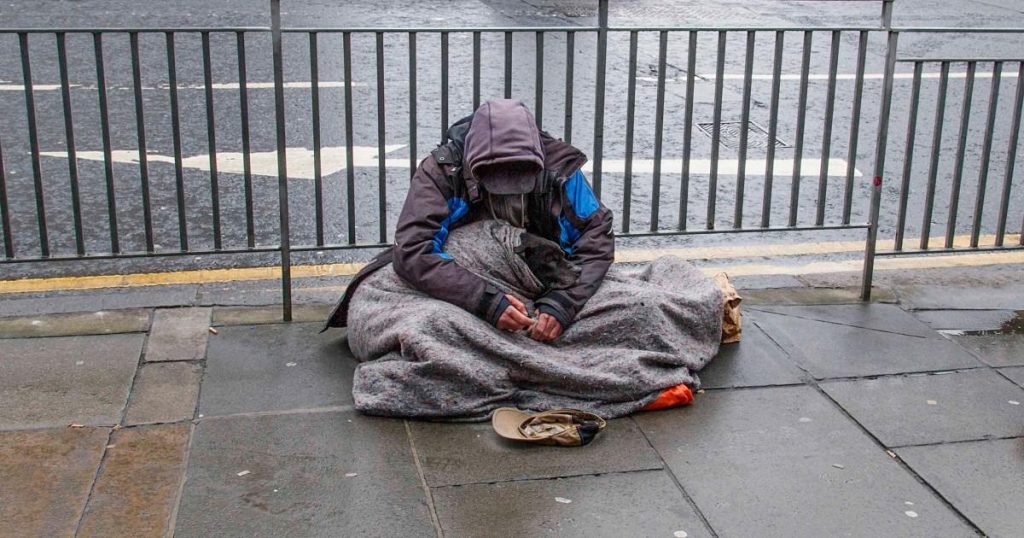The onset of 2025 has brought with it a familiar chill across the UK, with snow, flooding, and cold weather alerts impacting the nation. While many can seek refuge from the inclement weather, the homeless population faces a particularly harsh reality, bearing the brunt of the freezing temperatures. The UK Health Security Agency has issued a cold weather alert across England, and the Met Office has followed suit with yellow weather warnings encompassing almost all of England and Wales, and parts of Scotland, predicting significant snowfall, especially in the Midlands, Wales, and northern England. In response to the plunging temperatures, local councils across the UK are considering activating the Severe Weather Emergency Protocol (SWEP), a vital measure designed to provide emergency accommodation for rough sleepers and prevent weather-related fatalities.
If you encounter a rough sleeper and are concerned for their welfare, there are several steps you can take to assist them. In England and Wales, the most effective course of action is to contact Streetlink. This service acts as a crucial link between concerned citizens and local outreach services, including local authorities and homeless charities such as St Mungo’s. By providing Streetlink with the rough sleeper’s precise location, a description of their appearance, and the time of day you saw them, you enable outreach teams to locate the individual and offer the necessary support. When reporting through Streetlink, accurate information is paramount. Include details such as the specific area where the person is located, pinpointing it on a map if possible. Also, provide a description of their appearance, including any identifying characteristics, their name if known, and their approximate age. This information will aid outreach workers in quickly identifying and assisting the individual.
Alternatively, you can contact your local council directly to report the rough sleeper’s location and ensure they receive appropriate support. Most councils operate SWEP and have established procedures to help homeless individuals during severe weather. Remember, Streetlink is designed for adults. If the rough sleeper appears to be under 18, contacting the police is the appropriate action. In any situation where someone requires immediate medical attention, dial 999 without hesitation.
Beyond immediate assistance, there are numerous ways to contribute to long-term solutions for homelessness, particularly during the challenging winter months. Donating unused coats and blankets to organizations like Wrap Up UK or local homeless shelters provides much-needed warmth. The Salvation Army’s clothing banks also accept donations of warm clothing and blankets. Homeless Link offers a convenient way to locate nearby shelters and similar services. Directly offering warm food or drinks to a rough sleeper can also make a difference. However, it’s essential to approach the individual respectfully and inquire about their needs before offering anything. A simple, friendly conversation and a check on their well-being, coupled with a Streetlink report, can significantly impact their situation.
Financial contributions to homeless charities provide vital resources for shelter, food, and other essential services. Several reputable organizations, including Crisis, Shelter, Centrepoint, and The Big Issue Foundation, accept donations and work tirelessly to combat homelessness. Volunteering time and skills is another invaluable way to support these organizations. Check their websites for information on volunteer opportunities and current needs. Subscribing to The Big Issue magazine, sold by homeless vendors, directly supports their efforts to earn a living and rebuild their lives.
Supporting the homeless population requires a multifaceted approach, encompassing both immediate assistance and long-term solutions. Utilizing resources like Streetlink, donating to reputable charities, volunteering time, and even offering a kind word and a warm drink can make a tangible difference in the lives of those experiencing homelessness, especially during the harsh winter months. Remember, even small acts of kindness can have a profound impact on someone struggling to survive on the streets.
The cold weather poses significant health risks to everyone, but especially to rough sleepers who lack adequate shelter and protection from the elements. Hypothermia, frostbite, and respiratory illnesses are just some of the dangers they face. The Severe Weather Emergency Protocol (SWEP) is a crucial safety net, providing temporary accommodation and access to essential services during periods of extreme cold. However, relying solely on SWEP is insufficient. A more comprehensive and proactive approach to addressing homelessness is needed, one that focuses on preventing homelessness in the first place and providing long-term support for those already experiencing it.
Addressing homelessness requires a collaborative effort involving government agencies, charities, community organizations, and individuals. Increased funding for affordable housing, mental health services, and addiction treatment programs is essential. Public awareness campaigns can help dispel misconceptions about homelessness and encourage greater empathy and support for those experiencing it. Ultimately, creating a society where everyone has access to safe, stable housing and the support they need to thrive is the only way to truly end homelessness. Small acts of kindness, combined with systemic change, can make a world of difference in the lives of those experiencing homelessness and create a more compassionate and equitable society for all.











